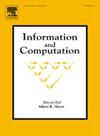分布式存储系统中复制纠删码的数据持久性研究
IF 1
4区 计算机科学
Q3 COMPUTER SCIENCE, THEORY & METHODS
引用次数: 0
摘要
本文研究了一般冗余方案系列(称为复制擦除码)的数据持久性基本问题。在复制擦除码中,每个文档被分成 p 个块,然后编码成 p+q 个块。然后,每个 p+q 块被复制成 r 个副本。我们分析了复制擦除码的两种分布策略:随机(所有数据块在存储节点之间随机分布)和顺序(数据块按顺序放入存储节点)。对于这两种策略,我们都推导出了当存储节点离开存储系统并擦除其本地存储的数据时,复制擦除码的预期数据持久性的闭式表达式和渐近界限。我们发现,在参数 p=1 时,两种放置策略的复制擦除码都能达到最大预期数据持久性,并给出了这种情况下的β函数公式。本文章由计算机程序翻译,如有差异,请以英文原文为准。
On the data persistency of replicated erasure codes in distributed storage systems
This paper studies the fundamental problem of data persistency for a general family of redundancy schemes, called replicated erasure codes. In replicated erasure codes each document is divided into p chunks and then encoded into chunks. Then, each of the chunks is replicated into r replicas. We analyze two strategies of replicated erasure codes distribution: random (all chunks are spread randomly among storage nodes) and sequential (the chunks are sequentially placed into storage nodes). For both strategies we derive closed-form expression and asymptotic bounds for expected data persistency of replicated erasure codes when the storage nodes leave the storage system and erase their locally stored data. We observe that the maximal expected data persistency of replicated erasure codes for both placement strategies is attained for parameter and give formulas in terms of the beta function in this case.
求助全文
通过发布文献求助,成功后即可免费获取论文全文。
去求助
来源期刊

Information and Computation
工程技术-计算机:理论方法
CiteScore
2.30
自引率
0.00%
发文量
119
审稿时长
140 days
期刊介绍:
Information and Computation welcomes original papers in all areas of theoretical computer science and computational applications of information theory. Survey articles of exceptional quality will also be considered. Particularly welcome are papers contributing new results in active theoretical areas such as
-Biological computation and computational biology-
Computational complexity-
Computer theorem-proving-
Concurrency and distributed process theory-
Cryptographic theory-
Data base theory-
Decision problems in logic-
Design and analysis of algorithms-
Discrete optimization and mathematical programming-
Inductive inference and learning theory-
Logic & constraint programming-
Program verification & model checking-
Probabilistic & Quantum computation-
Semantics of programming languages-
Symbolic computation, lambda calculus, and rewriting systems-
Types and typechecking
 求助内容:
求助内容: 应助结果提醒方式:
应助结果提醒方式:


